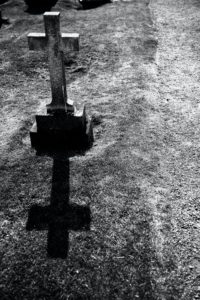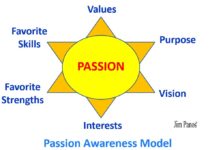The Fear of Death – Part of Chapter V of the upcoming book “Find Your Passion”

The Fear of Death – Part of Chapter V of the “Find Your Passion”
“Natural Death Is Bad”
Here lies the fear of death, one of the biggest fears, if not the biggest, of mankind. It comes from the belief that “natural death is bad.” By “natural,” I mean death by natural causes, like aging. You need to know no more than two things here. First, you need to stop avoiding admitting your mortality, that this day will come, sooner or later. Second, you know deep within you that the fear of death is not about death itself, but something else. It can be because of the belief that “death is suffering,” which is not true, as we’ve said in the “pain is suffering” belief.
On the other hand, many people are afraid of death because they’re actually afraid of not living the life they truly want. This was definitely my case. “What if I die early and do not complete my vision?” I used to wonder. I still do sometimes. At least now I use the realization that “death is part of life” as a sense of urgency and a source of inner drive. You can do the same.
It’s true that technology grows exponentially every single year, and it’ll grow even faster because of the pandemic, making the scenario of “human digitalization” (“uploading” your skillset and personality traits to the cloud and in a digital device, such as a PC) a strong possibility. If you believe that this is part of my great imagination, then search online for Neuralink, the company that business magnate Elon Musk founded to make this idea a reality. In fact, many more business magnates have invested in Artificial Intelligence (AI), not only for the purposes of automation and productivity but also to “solve the problem of death.” This makes you technically immortal. By “technically,” I mean that we really don’t know the actual results of human digitalization. Can we really replicate one’s brain and mind? If so, to what extent? Will they ever be the same? We don’t know. It doesn’t matter.
Because, regardless of the inconceivable progress and potential of science through AI, IT, robotics, neuroscience, and nanotechnology, we should not use the above as alibis to keep ignoring and undermining the value of death. Yes, there’s wisdom everywhere, including death.
“How’s it possible to even think of death as something positive?” you might be wondering. “There’s no worse thing than this. It’s the end of life. My life!” I really don’t know if it’s the end of life or not. But I do know something that is even worse: underestimating the value of time, not pursuing your passion, and not living the life you truly want. I cannot accept this for you, and I won’t let you accept it either. The existence of death itself can function as our “dreams and life deadline.” What’s great with deadlines is that they propel you to do the things you want to do and be the person you want to become in a certain period of time. These things include your passion and all the aspirations and goals that you would have never pursued otherwise if it wasn’t for your “life deadline.” Death gives value to our life, makes every single second count, and is the most powerful reminder of the need to live the life we truly want.
Because we’re not really afraid of death. We are afraid of not living the life we truly desire to live. That’s why we avoid reminding ourselves that time is limited, trying to convince ourselves that “sure, there’s plenty of time. I’ll find and follow my passion later,” and so on. You see, it’s more likely for you to regret the things you’ve never done than the things you actually did. And this is not just an opinion.
Bronnie Ware, an Australian nurse who spent several years working in palliative care as a hospice worker caring for patients in the last twelve weeks of their lives, recorded her patients’ dying epiphanies in her book The Top Five Regrets of the Dying. Guess what was the top regret? Their main regret was not “I wish I’d had the courage to express my feelings,” or “I wish that I had let myself be happier,” although they are big ones. Their top regret was this: “I wish I’d had the courage to live a life true to myself, not the life others expected of me.”[1]
Our time is limited. Your time is limited. It’s called life. Death is here to remind us of that. So, next time you say “I’ll do it later” for something that really matters to you, like your passion, remember this regret. Because it’ll be your regret—unless! Unless you accept your mortality and pursue your passion and the life you really want, right now.
The “Find Your Passion” book is finally out!!!! Check it out and order it to transform your career and life here!
[1] Bronnie Ware, The Top Five Regrets of the Dying: A Life Transformed by the Dearly Departing, reprint edition (Hay House Inc., 20 March, 2012).


